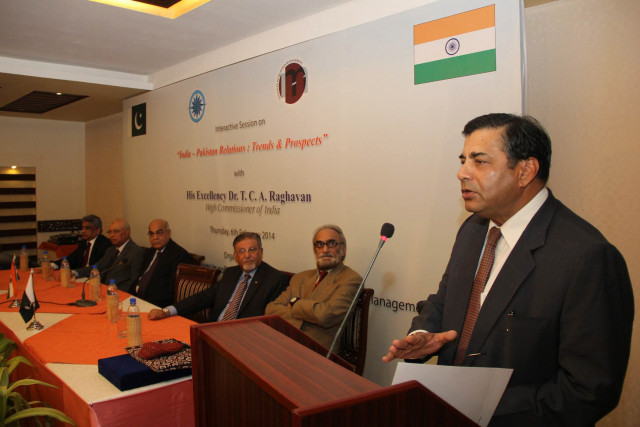Friendly talk: Indian HC says a stable Pakistan in India’s national interest
Says countries should see solutions not as big-bang events, but processes.

"We should not correlate Hindu-Muslim relations with India-Pakistan relations," TCA Raghavan, the Indian High Commissioner to Pakistan. PHOTO: MOHAMMAD NOMAN/EXPRESS
“It is always challenging to speak on India-Pakistan relations in both countries,” he said, while identifying three key periods in Pakistan and India’s history — the first decade after 1947 when relations were first established, 1979, which he argues was, from a South Asian perspective, the most consequential year, and 1999 until now.
He repeated Manmohan Singh’s statements when he said he longs to have breakfast in Amritsar, lunch in Lahore, and dinner in Kabul, and assured the audience that it is in India’s national interest to have “a stable Pakistan at peace with itself”.

In the 1950’s, he said, we had “deep diplomacy” because the connections were so raw. “Diplomats and civil servants were on a first-name basis.” He mentioned bilateral cricket series, and eased travel restrictions.
Yet, 1979 was a seminal year, he said. The Iranian revolution, the Soviet invasion of Afghanistan, and Pakistan’s own political turmoil meant that there would be a setback for many years to come. And while 2000 was an inauspicious start to India-Pakistan relations, many advancements have been made in “technology, travel and trade.”
How to be friendly
Raghavan was clear on what good relations hinged on — one, a mutually declared ceasefire at the Line of Control and two, the inability of terrorist groups to launch attacks on India from Pakistani soil. “Relations tend to dip whenever either of these conditions are not met.”
He spoke of “being candid” and criticised the idea of “dancing around the big issues” but surprisingly, he did not mention Kashmir in his speech till prompted by an admittedly incensed audience member. His answer was curt, but nevertheless worthy of reflection. “When you have two totally opposed viewpoints on a national issue, how do you move forward?”
Within the diplomat-speak, he did have a word of advice that seemed to come from the decades in diplomacy that he had spent, “We should see solutions not as big-bang events, but processes.” The high commissioner alluded to the constant need to engage, rather than end-all policies that define (good) relations.
Routinely, however, he would come back to terrorism as the decisive obstacle to a South Asian détente. “Terrorism is a not a rational consequence of differences between neighbours.”
Published in The Express Tribune, February 7th, 2014.



















COMMENTS
Comments are moderated and generally will be posted if they are on-topic and not abusive.
For more information, please see our Comments FAQ